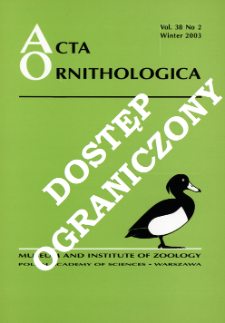- Search in all Repository
- Literature and maps
- Archeology
- Mills database
- Natural sciences
Advanced search
Advanced search
Advanced search
Advanced search
Advanced search

Object
Title: Restoration of the ruddy shelduck Tadorna ferruginea population in "Ascania Nova" nature reserve (Southern Ukraine)
Creator:
Zubko, Valentina ; Havrilenko, Victor ; Semenov, Nikolay
Date issued/created:
Resource type:
Subtitle:
Acta Ornithologica, vol. 36, no. 1 ; Restytucja populacji kazarki w rezerwacie "Askania Nowa" na Ukrainie
Contributor:
Polska Akademia Nauk. Muzeum i Instytut Zoologii ; Meeting of the European Ornithologists' Union (2 ; 1999 ; Gdańsk)
Publisher:
Muzeum i Instytut Zoologii PAN
Place of publishing:
Description:
Referat wygłoszony na Second Meeting of the European Ornithologists' Union ; Bibliogr. s. 99-100 ; S. [97]-100 : il. ; 27 cm ; Streszcz. pol. Nazwy taksonów także w jęz. łac.
Type of object:
Abstract:
In the XIX century the Ruddy Shelduck was regarded as a common species in Ukraine. Now it is in the Red Data Book of Ukraine and on the Berne Convention List. In 1885 it appeared in the Ascanian Zoo, and a year later there were 16 birds. Nowadays, in the summer and autumn their numbers range from 700 to 1200. The territorial centre of the population are the zoo ponds and the botanical garden, where 48-65 pairs nest. This semi-wild population has been formed as a result of successive acclimatization measures: forming broods with foster parents (Tadorna ferruginea, Cairina moschata, Anas platyrhynchos), creating artificial nests, regular feeding, and the availability of unfrozen water in the pond. Free-living birds migrate from Ascania Nova to other places, even to distant regions.
Relation:
Volume:
Issue:
Start page:
End page:
Detailed Resource Type:
Artykuł ; Materiały konferencyjne
Format:
Resource Identifier:
Source:
MiIZ PAN, patrz sygn. czas. P.257, Vol. 36, No 1 ; MiIZ PAN, patrz sygn. czas. P.4568, Vol. 36, No 1 ; click here to follow the link
Language:
Rights:
Prawa zastrzeżone - dostęp ograniczony
Terms of use:
Digitizing institution:
Muzeum i Instytut Zoologii Polskiej Akademii Nauk
Original in:
Biblioteka Muzeum i Instytutu Zoologii PAN
Projects co-financed by:
Program Operacyjny Innowacyjna Gospodarka, lata 2010-2014, Priorytet 2. Infrastruktura strefy B + R ; Unia Europejska. Europejski Fundusz Rozwoju Regionalnego
Access:
Object collections:
- Digital Repository of Scientific Institutes > Partners' collections > Museum and Institute of Zoology PAS > Scientific Journals
- Digital Repository of Scientific Institutes > Partners' collections > Museum and Institute of Zoology PAS > MIZ PAN Publications > Acta Ornithologica
- Digital Repository of Scientific Institutes > Literature > Journals/Articles
Last modified:
Oct 2, 2020
In our library since:
May 23, 2014
Number of object content downloads / hits:
56
All available object's versions:
https://rcin.org.pl./publication/61305
Show description in RDF format:
Show description in RDFa format:
Show description in OAI-PMH format:
Objects Similar
Lewartowski, Zenon Stawarczyk, Tadeusz (1952– ) Winiecki, Aleksander (1956– )
Ardamackaâ, Tat'âna Borisovna (1927–2011)
Schmidt, Günter (zoologia ; 1928- )
Engel, Jacek Keller, Marek Leszkowicz, Jan Zawadzki, Jerzy
Habitat choice of steller's eider Polysticta stelleri wintering at Lithuania coast of the Baltic Sea
Žydelis, Ramunas
Dereliev, Sergej Hulea, Dan Ivanov, Bozhidar Sutherland, William J. Summers, Ron W.
Ebbinge, Barwolt Sijbrand (1949– ) Biezen, Johan B. van
Kazulìn, Alâksandr Vasìl'evìč

 INSTYTUT ARCHEOLOGII I ETNOLOGII POLSKIEJ AKADEMII NAUK
INSTYTUT ARCHEOLOGII I ETNOLOGII POLSKIEJ AKADEMII NAUK
 INSTYTUT BADAŃ LITERACKICH POLSKIEJ AKADEMII NAUK
INSTYTUT BADAŃ LITERACKICH POLSKIEJ AKADEMII NAUK
 INSTYTUT BADAWCZY LEŚNICTWA
INSTYTUT BADAWCZY LEŚNICTWA
 INSTYTUT BIOLOGII DOŚWIADCZALNEJ IM. MARCELEGO NENCKIEGO POLSKIEJ AKADEMII NAUK
INSTYTUT BIOLOGII DOŚWIADCZALNEJ IM. MARCELEGO NENCKIEGO POLSKIEJ AKADEMII NAUK
 INSTYTUT BIOLOGII SSAKÓW POLSKIEJ AKADEMII NAUK
INSTYTUT BIOLOGII SSAKÓW POLSKIEJ AKADEMII NAUK
 INSTYTUT CHEMII FIZYCZNEJ PAN
INSTYTUT CHEMII FIZYCZNEJ PAN
 INSTYTUT CHEMII ORGANICZNEJ PAN
INSTYTUT CHEMII ORGANICZNEJ PAN
 INSTYTUT FILOZOFII I SOCJOLOGII PAN
INSTYTUT FILOZOFII I SOCJOLOGII PAN
 INSTYTUT GEOGRAFII I PRZESTRZENNEGO ZAGOSPODAROWANIA PAN
INSTYTUT GEOGRAFII I PRZESTRZENNEGO ZAGOSPODAROWANIA PAN
 INSTYTUT HISTORII im. TADEUSZA MANTEUFFLA POLSKIEJ AKADEMII NAUK
INSTYTUT HISTORII im. TADEUSZA MANTEUFFLA POLSKIEJ AKADEMII NAUK
 INSTYTUT JĘZYKA POLSKIEGO POLSKIEJ AKADEMII NAUK
INSTYTUT JĘZYKA POLSKIEGO POLSKIEJ AKADEMII NAUK
 INSTYTUT MATEMATYCZNY PAN
INSTYTUT MATEMATYCZNY PAN
 INSTYTUT MEDYCYNY DOŚWIADCZALNEJ I KLINICZNEJ IM.MIROSŁAWA MOSSAKOWSKIEGO POLSKIEJ AKADEMII NAUK
INSTYTUT MEDYCYNY DOŚWIADCZALNEJ I KLINICZNEJ IM.MIROSŁAWA MOSSAKOWSKIEGO POLSKIEJ AKADEMII NAUK
 INSTYTUT PODSTAWOWYCH PROBLEMÓW TECHNIKI PAN
INSTYTUT PODSTAWOWYCH PROBLEMÓW TECHNIKI PAN
 INSTYTUT SLAWISTYKI PAN
INSTYTUT SLAWISTYKI PAN
 SIEĆ BADAWCZA ŁUKASIEWICZ - INSTYTUT TECHNOLOGII MATERIAŁÓW ELEKTRONICZNYCH
SIEĆ BADAWCZA ŁUKASIEWICZ - INSTYTUT TECHNOLOGII MATERIAŁÓW ELEKTRONICZNYCH
 MUZEUM I INSTYTUT ZOOLOGII POLSKIEJ AKADEMII NAUK
MUZEUM I INSTYTUT ZOOLOGII POLSKIEJ AKADEMII NAUK
 INSTYTUT BADAŃ SYSTEMOWYCH PAN
INSTYTUT BADAŃ SYSTEMOWYCH PAN
 INSTYTUT BOTANIKI IM. WŁADYSŁAWA SZAFERA POLSKIEJ AKADEMII NAUK
INSTYTUT BOTANIKI IM. WŁADYSŁAWA SZAFERA POLSKIEJ AKADEMII NAUK


































